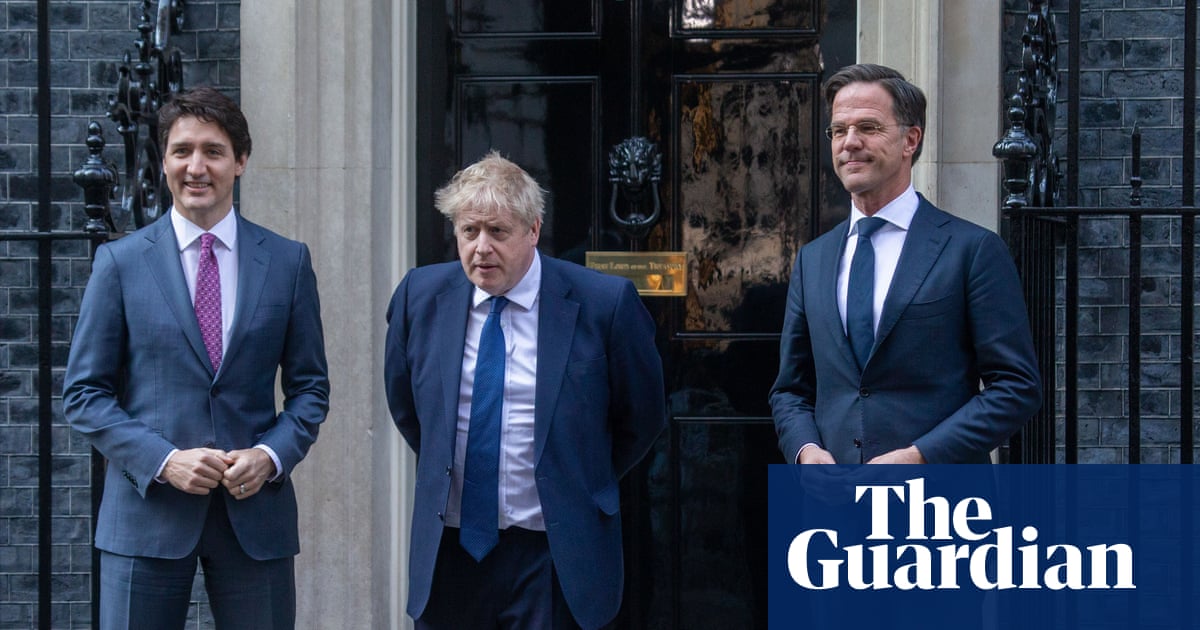
Boris Johnson has said the UK may have to increase its domestic gas and oil production in order to wean itself off Russian resources, despite the opposition of climate campaigners and some scepticism in the cabinet.
The prime minister said the UK was looking at increasing North Sea output, although critics say it would take two decades to ramp up significantly and would have little immediate effect on the impending rise in domestic energy bills.
Speaking at a Downing Street press conference, Johnson said: “One of the things we are looking at is the possibility of using more of our own hydrocarbons, and you’ll have heard already about what the business secretary has had to say about licences for UK domestic production.
“That doesn’t mean we are abandoning our commitment to reducing CO2 … We have got to reflect the reality that there is a crunch on at the moment. We need to intensify our self-reliance as a transition with more hydrocarbons.”
Johnson said he would be setting out an energy supply strategy in the days ahead “so that people have a sense of how we are going to meet people’s needs over the short, medium and long term”.
He insisted the increased focus on North Sea production would not undermine the UK’s push for net zero, but claimed it was a necessary move to ease the transition to renewables and nuclear.
Standing alongside Justin Trudeau, the Canadian prime minister, and Mark Rutte, the Dutch prime minister, he said a ban on Russian fossil fuels was “very much on the table”. But he also agreed with Rutte that it could not be immediate and needed to be done “step by step”, with countries each going at their own pace.
Since Russia’s invasion of Ukraine, global oil and gas prices have climbed, with the price of Brent crude at $139 a barrel – its highest level in 14 years – bringing the average petrol price to a record high of 155p a litre. The price of gas has soared by 70% since Friday to 800p a therm – 20 times its level two years ago. The extraction of oil and gas off the coast of the UK may be more economically viable with high oil and gas prices.
However, climate campaigners gave a scathing verdict. Greenpeace UK’s head of politics, Rebecca Newsom, said: “Boris Johnson is right that we urgently need to end our dependence on Russian gas, but more drilling in the North Sea is not the solution. It could take a quarter of a century to open up new gas fields, and the product will then be sold to the highest bidder on the global market, having no impact on our energy bills. It makes a lot more sense to reduce our gas dependence by insulating homes, installing heat pumps and boosting renewables.
Some cabinet ministers who support the push for net zero are concerned that Tories opposed to the target are using Russia’s invasion of Ukraine to undermine climate goals. The Times reported on Monday that Johnson was prepared to give gas companies a “climate pass” in order to increase reliance on the fossil fuel while the west weans off Russian gas, even at the expense of climate change targets.
A source close to one pro-net zero cabinet minister said: “There’s been a resurgence of this kind of argument, but it’s for the birds that anything is going to change. Every G7 country has a net zero target, and we now know, given the circumstances in Ukraine, that getting to net zero is very much in the interests of national security.”
Another cabinet source said it made sense to continue North Sea production as it was better to have gas supply domestically than elsewhere, but highlighted that “gas is expensive, and more expensive than any renewable”, adding that there was no quick fix for the problem of high prices.
The climate change committee, which advises the government on reaching net zero and other targets, has said the best way of reducing the UK’s exposure to volatile prices was cutting fossil fuel consumption. Overall, it backed a tighter limit on production and a presumption against exploration.
“Any increases in UK extraction of oil and gas would have, at most, a marginal effect on the prices faced by UK consumers in future,” it said.
However, it has also said the evidence is not clear-cut as UK extraction has a “relatively low carbon footprint [more clearly for gas than for oil] and the UK will continue to be a net importer of fossil fuels for the foreseeable future, implying there may be emissions advantages to UK production replacing imports”. It also highlighted energy security factors.
Source: Guardian








